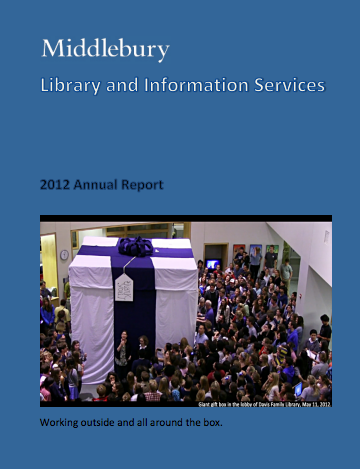We’ve just posted the LIS Annual Report at http://www.middlebury.edu/media/view/438265/original/lis_annual_report_011_012.pdf
Thanks to Doreen Bernier and all who contributed to pulling this together.
Here’s the introduction:
Reading through the over 20 pages of dense detail within this report provides a snapshot of how the rapid changes within the world of technology and information services are impacting the way the Middlebury community is creating, sharing, and using information in service of the College’s mission to create the world’s first and foremost global liberal arts college. From e-books to smart phones, Facebook, twitter, discovery tools that mimic Google, paperless admissions, shifting to hosted services, increasing the number of smart classrooms, building more resilient and secure infrastructure, and building information literacy programs to prepare our students for new modes of research and communication, we are quickly and radically changing how we provide service to our community. And in the face of all of this novelty, we also continue to operate our bread and butter services: email, circulation, interlibrary loan, the distribution of new computers, building collections (and special collections!). Each year as I write this introduction, I marvel at the sheer amount of activity required to balance these two competing demands: providing reliable services that meet existing needs, and putting in place new services and resources that meet emerging needs. I wish I could honestly say that the next year will be a less busy year, but looking over our ambitious goals for the upcoming year, and reviewing the goals of the College, the best I can offer is this: it is clearer than ever that we all need to get better at setting priorities, at working with our campus partners to establish what is essential, and what can wait. LIS will continue to play a central role in enabling innovation and transformation at the College, and also in serving as an information utility company that just needs to work 24/7. In looking at our myriad accomplishments from last year, it is clear that we have the willingness and ability to play these two important roles. Our challenge, and it is a challenge across our campuses, is to learn how to do all of this in a sustainable way, being both planful, but also opportunistic. The good news is that the entire campus is focusing its attention on planning and prioritization, and so our efforts will take place in the context of a new annual college- wide planning process.
